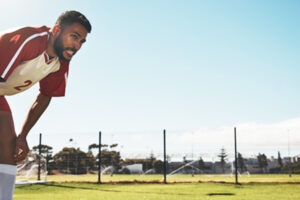
Why players do not need fitness FOR football
Universal football reference
A football action is the interaction of a footballer with the football environment. This process consists of three phases: 1) communication, 2) decision making and 3) executing a decision. This applies to every player and every coach in football. That is why we can call this a universal football reference. Thanks to this reference, we can uncover and solve one of the biggest thinking errors in football.
Universal football fitness reference
An athlete like Usain Bolt only had to perform one action by sprinting for 100 metres and then he was done. This is different for football players. They have to repeat the football action cycle of ‘communication-decision making-executing decision’ hundreds of times over a period of 90 minutes. In the first half, players should be able to repeat this cycle as frequently as possible. In other words, they should be able to perform more actions per minute. In the second half, players must be able to maintain both the quality and quantity of communication, decision making and executing decisions, for as long as possible because the game lasts 90 minutes. Together, these aspects form the definition of football fitness in football action language:
‘Communication, decision making and executing decisions, as frequently as possible to play at a higher tempo and for as long as possible because the game lasts 90 minutes.’
This definition of football fitness applies to players of any age, gender or level of play. Whoever you are, no matter how old you are, wherever you live, however good you can play football, whatever a player does on the pitch is the same for everyone: communication, decision making and executing decisions, as frequently as possible to play at a higher tempo and for as long as possible because the match lasts 90 minutes. That’s why this is a universal football fitness reference: communication, decision making executing decisions and football fitness (CDEF).
Fitness IN the football context
With the help of this universal CDEF reference, we can create even more clarity in the subjective and chaotic football world. We can objectively establish that football fitness is not the same as running, muscles or energy systems. Football fitness is fitness in the context of football. Football fitness means interacting with the football environment, more frequently and for longer. In other words, football fitness only exists in the football context. The logical consequence of this objective definition is that if players are not interacting with the football environment, they are not performing football (inter)action and, subsequently, not improving their football fitness.
Basic Action Fitness
When players are running around the pitch or sprinting between cones, they are still interacting with the environment. Therefore, they are still performing (inter)actions. However, as they are not interacting with the specific football environment, they are performing general and non-contextual actions, i.e. Basic Actions, rather than football actions. As a result, when running around the pitch or sprinting between cones, players are developing their ‘basic action fitness’.
Players do not need fitness FOR football
What we can conclude based on the above is that players need fitness IN the football context. When interacting with the football environment, players must be able to perform these interactions as frequently and for as long as possible. This ability is what we call football fitness. However, traditionally it was thought that players first have to develop fitness beFORe they are able to play football. These thinking mistakes are a logical consequence of the fact that a universal definition is missing. This also explains why players had to run around the pitch and sprint between cones in an attempt to develop (non-contextual) fitness FOR football.
Many coaches honestly thought that fitness was something else than football. A precondition that had to be developed to allow players to play football. But even today, despite the introduction of the universal football (fitness) reference, some coaches still think that there is a big overlap between ‘basic action fitness’ and ‘football fitness’. They still force players to run around the pitch to develop ‘running fitness’. Coaches use the argument that players also have to run while playing football. However, in fact running is only part of a football action, at best.
Firstly, a player must be able to communicate well with the environment for 90 minutes and then be able to make the right decision for 1,5 hours. And yes, during the execution of a decision, it can happen that a player has to run. But maintaining football actions is maintaining communication, decision making and executing decisions and not just the ability to maintain running. Football fitness training means developing the ability to perform the ‘communication-decision making-executing decision’ cycle as frequently and for as long as possible. Therefore, the transfer from ‘running fitness’ to ‘football fitness’ is not as big as some people like to believe.
Football fitness coach
The logical conclusion of this blog is that the football fitness coach is the person how helps players improve their ability to perform the ‘communication-decision making-executing decision’ cycle as frequently and for as long as possible. As a logical consequence of the missing universal football fitness definition, for decades coaches have called themselves football fitness coach while in reality they were ‘basic action fitness coaches’. This means that their job title is incorrect. They train A and suggest that B improves as a result. It seems more logical to train B if you want to improve B, but in a (football) world without a universal language and objective references, people find it quite normal for someone to do A to improve B.
Hopefully, in the upcoming years, the world of football will become a world with clear references, terms and definitions. As a result, people can no longer do and say whatever they want at the expense of players and without having to take responsibility.


